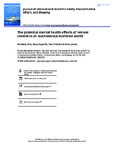The potential mental health effects of remote control in an autonomous maritime world
| dc.contributor.author | Tam, K | |
| dc.contributor.author | Hopcraft, Rory | |
| dc.contributor.author | Crichton, T | |
| dc.contributor.author | Jones, Kevin | |
| dc.date.accessioned | 2021-05-26T08:32:30Z | |
| dc.date.issued | 2021-05-26 | |
| dc.identifier.issn | 2572-5084 | |
| dc.identifier.issn | 2572-5084 | |
| dc.identifier.uri | http://hdl.handle.net/10026.1/17202 | |
| dc.description.abstract |
Many maritime activities, such as loading, unloading and transporting cargoes, consist primarily of long periods of low-stress, with some moments of high stress during complex manoeuvres or unanticipated, dangerous, incidences. The increase in autonomy provided by machines and AI is beginning to take over certain tasks in the maritime sector, to reduce costs and mitigate human error. However, with the current levels of autonomous technology available, legislation, and public trust in the technology, such solutions are only able to remove majority of tasks associated with low-stress periods. In fact, many current remote control solutions still suggest relying on human operators to deal with the complex situations AI struggle with. Such a human–automation relationship could endanger the human element. The concern is that, if the human user is spending a disproportionate part of their time dealing with multiple, unconnected, high-stress tasks, without periods to de-stress, this could increasingly put workers at risk. This paper seeks to highlight potential technical, social, and mental, issues that may arise as the sector begins implementing semi-autonomous and fully autonomous maritime operations. | |
| dc.format.extent | 51-66 | |
| dc.language | en | |
| dc.language.iso | en | |
| dc.publisher | Informa UK Limited | |
| dc.subject | Mental Health | |
| dc.subject | Clinical Research | |
| dc.title | The potential mental health effects of remote control in an autonomous maritime world | |
| dc.type | journal-article | |
| dc.type | Journal Article | |
| plymouth.issue | 2 | |
| plymouth.volume | 5 | |
| plymouth.publication-status | Published | |
| plymouth.journal | Journal of International Maritime Safety, Environmental Affairs, and Shipping | |
| dc.identifier.doi | 10.1080/25725084.2021.1922148 | |
| plymouth.organisational-group | /Plymouth | |
| plymouth.organisational-group | /Plymouth/Faculty of Science and Engineering | |
| plymouth.organisational-group | /Plymouth/REF 2021 Researchers by UoA | |
| plymouth.organisational-group | /Plymouth/REF 2021 Researchers by UoA/UoA11 Computer Science and Informatics | |
| plymouth.organisational-group | /Plymouth/Users by role | |
| plymouth.organisational-group | /Plymouth/Users by role/Academics | |
| dcterms.dateAccepted | 2021-03-31 | |
| dc.rights.embargodate | 2021-5-28 | |
| dc.identifier.eissn | 2572-5084 | |
| dc.rights.embargoperiod | Not known | |
| rioxxterms.versionofrecord | 10.1080/25725084.2021.1922148 | |
| rioxxterms.licenseref.uri | http://www.rioxx.net/licenses/all-rights-reserved | |
| rioxxterms.licenseref.startdate | 2021-05-26 | |
| rioxxterms.type | Journal Article/Review |


